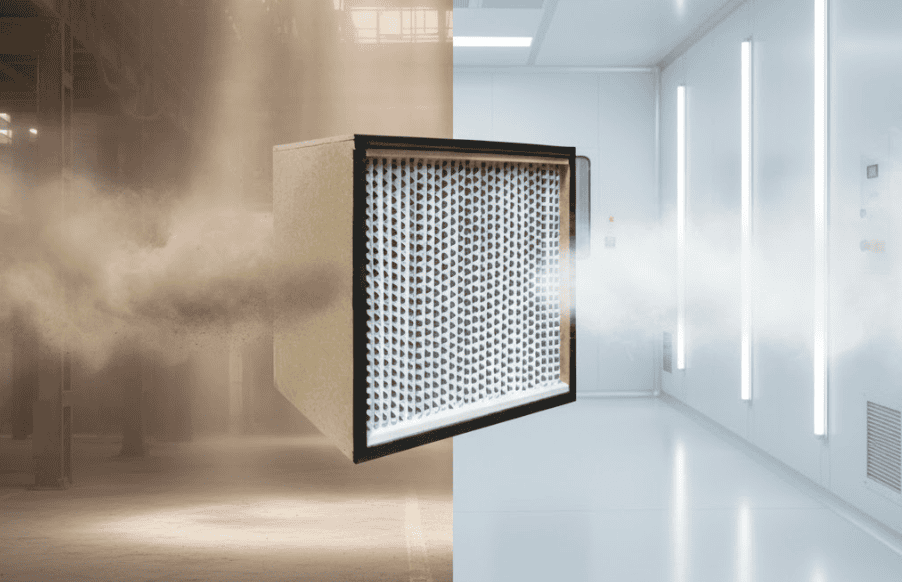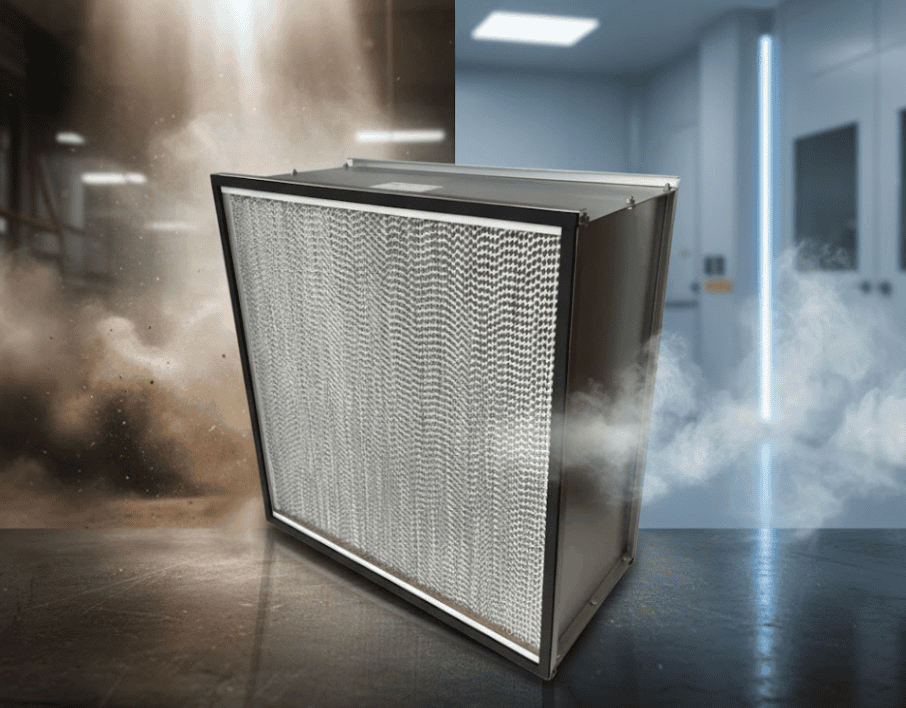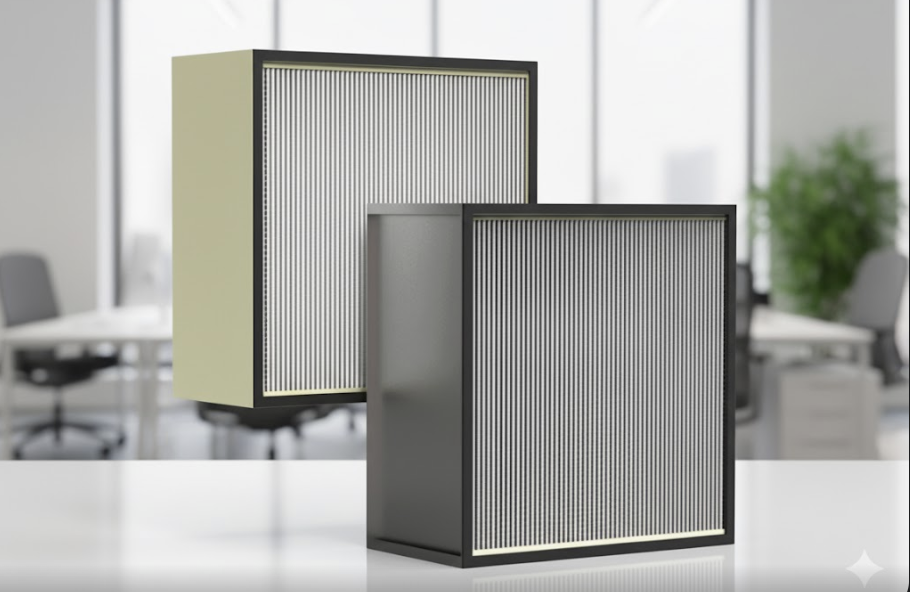Posted by Spycor LLC on Oct 19th 2025

When working in dusty construction sites or maintaining a true cleanroom, you need a filtration solution that tackles everything from large debris to fine dust and fumes. Affordable HEPA filters are the gold standard, capturing 99.97% of particles as small as 0.3 microns to ensure clean, safe air. This buyer’s guide is designed for contractors, facility managers, and cleanroom operators ready to invest in high-performance HEPA filters without breaking the bank. We’ll explore top products, key features, and how to choose the right filter for your needs, all while keeping costs low. Discover why Spycor.com’s affordable HEPA filters are perfect for your air quality challenges.
What Are HEPA Filters and Why Are They
Essential?
HEPA (High-Efficiency Particulate Air) filters are engineered to remove at least 99.97% of airborne particles down to 0.3 microns, including dust, mold spores, pollen, and chemical fumes. Made from tightly woven glass or synthetic fibers in a pleated design, they maximize surface area to trap contaminants through interception, impaction, and diffusion. These filters are critical in environments like construction sites, industrial facilities, hospitals, and cleanrooms where air purity is non-negotiable.
In dusty areas, HEPA filters prevent health risks from silica dust or asbestos, while in cleanrooms, they maintain ISO-compliant air quality for pharmaceuticals or electronics manufacturing. Unlike standard filters, HEPA filters meet stringent standards like ASHRAE 52.2 and are often paired with negative air machines or HVAC systems for optimal performance.
Key features include:
- High Efficiency: Captures ultra-fine particles with 99.97% or 99.99% efficiency.
- Durable Frames: Available in wood for cost savings or metal for harsh conditions.
- Versatile Sizes: Common dimensions like 24x24x12 inches fit most systems.
Why Choose Affordable HEPA Filters?

Affordable HEPA filters deliver professional-grade air purification at a fraction of the cost of premium models. They protect workers and occupants by reducing exposure to harmful particles, which the EPA links to a 50% decrease in respiratory issues in high-risk settings. For contractors, this means safer job sites and compliance with OSHA regulations, avoiding fines that can exceed $15,000 per violation.
Cost savings extend beyond health. By removing contaminants efficiently, HEPA filters reduce HVAC maintenance and extend equipment life, saving 10-20% on energy costs, per DOE studies. Their robust construction ensures 6-12 months of use, making them a budget-friendly choice for small businesses or large-scale operations.
Benefits include:
- Health Safety: Minimizes allergies, asthma, and infections.
- Cost Efficiency: Affordable pricing with long-term savings.
- Compliance: Meets standards for cleanrooms and industrial sites.
- Versatility: Works in HVAC systems, air scrubbers, or standalone units.
Top Affordable HEPA Filter Options
Spycor.com offers a range of affordable HEPA filters designed for dusty environments and cleanrooms. Here are three standout options, all priced competitively to deliver value.
Glasfloss Industries HEPA Filter (99.97% Efficiency)
This filter features a wood frame and 99.97% efficiency, ideal for construction sites or commercial HVAC systems. Its 24x24x12-inch size fits standard setups, and the pleated design ensures high dust-holding capacity.
Highlights:
- Lightweight wood frame for easy installation.
- Captures dust, mold, and fumes effectively.
- Perfect for renovation projects or office buildings.
Koch Filter HEPA (99.99% Efficiency)
Designed for cleanrooms, this metal-frame filter offers 99.99% efficiency for ultra-fine particles down to 0.12 microns. It’s suited for hospitals, labs, or electronics manufacturing where precision is critical.
Key features:
- Corrosion-resistant metal frame for durability.
- Meets ISO 14644 cleanroom standards.
- Handles high airflow without compromising performance.
Glasfloss HEPA with Metal Frame
This model combines affordability with rugged construction, using a galvanized steel frame for moist or chemical-heavy environments. It’s versatile for industrial sites or coastal areas.
Advantages:
- Resistant to corrosion and wear.
- Supports high-volume air systems.
- Cost-effective for long-term use.
Comparing Affordable HEPA Filters
| Filter Model | Efficiency | Frame Material | Size | Best For | |
|---|---|---|---|---|---|
| Glasfloss HEPA | 99.97% | Wood | 24x24x12 inches | Construction sites | |
| Koch HEPA | 99.99% | Metal | 24x24x12 inches | Cleanrooms | |
| Glasfloss Metal Frame | 99.97% | Galvanized Steel | 24x24x12 inches | Industrial settings |
These filters balance cost and performance, making them accessible for various budgets and applications.
How to Choose the Right HEPA Filter
Selecting the best HEPA filter depends on your environment and requirements. Consider these factors:
- Environment Type: Dusty construction sites need 99.97% efficiency; cleanrooms may require 99.99% for finer particles.
- System Compatibility: Ensure filter size (e.g., 24x24x12 inches) matches your HVAC or negative air machine.
- Frame Material: Wood for cost savings in dry conditions; metal for humidity or chemical exposure.
- Airflow Needs: Check CFM ratings to match your system’s capacity (e.g., 450-1950 CFM for negative air machines).
For example, a contractor working on a demolition project should opt for a wood-frame Glasfloss filter for affordability, while a lab manager needs a Koch 99.99% filter for cleanroom compliance. Budget-friendly prices ($100-350) ensure accessibility.
Installation Best Practices
Proper installation maximizes HEPA filter performance. Follow these steps:
- Assess System: Confirm compatibility with your HVAC or air scrubber.
- Seal Edges: Use gaskets or tape to prevent air bypass.
- Install Pre-Filters: Extend HEPA life by capturing larger debris first.
- Test Airflow: Ensure no leaks compromise filtration.
In cleanrooms, maintain negative pressure with a negative air machine. For dusty sites, pair with pre-filters rated MERV 8-13. Common mistakes to avoid: incorrect sizing or loose seals, which reduce efficiency.
Maintenance Tips for HEPA Filters
To keep HEPA filters performing:
- Replace Regularly: Every 6-12 months, or sooner in high-dust areas.
- Monitor Pressure Drop: Use manometers to detect clogs.
- Avoid Washing: Replace filters to maintain efficiency.
- Inspect Monthly: Check for damage or leaks in industrial settings.
Pairing with pre-filters extends lifespan, especially in construction environments with heavy particulate loads.
Investing in affordable HEPA filters ensures clean, safe air for your projects or facilities. Whether you’re combating dust on a job site or maintaining a cleanroom, these filters deliver results.
Click Here to explore the full range of affordable HEPA filters at Spycor.com and secure your order today.
FAQ: Common Questions About Affordable
HEPA Filters
What makes HEPA filters effective for dusty environments?
They capture 99.97% of particles like dust, mold, and fumes as small as 0.3 microns, ensuring clean air in construction or industrial sites.
Are affordable HEPA filters suitable for cleanrooms?
Yes, models like Koch 99.99% filters meet ISO 14644 standards for cleanrooms in labs or hospitals.
How often should I replace HEPA filters?
Replace every 6-12 months, or sooner in high-dust areas, to maintain filtration efficiency.
Can HEPA filters handle chemical fumes?
They capture fume particles; pair with carbon filters for odor and gas neutralization.
What’s the difference between wood and metal frame HEPA filters?
Wood frames are lightweight and cheaper for dry environments; metal frames resist corrosion in humid or chemical-heavy settings.
Where can I buy affordable HEPA filters?
Spycor.com offers Glasfloss and Koch HEPA filters, perfect for construction, industrial, or cleanroom use.



